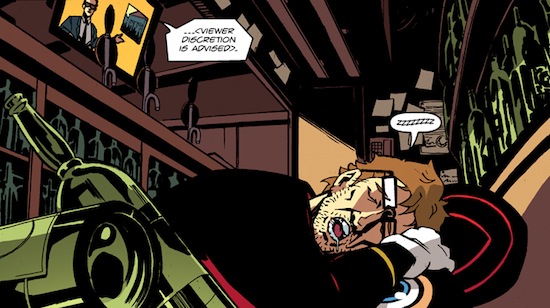Well, well. Seems we haven’t had a Comics Column in quite some time. Apologies if we’ve left you hanging. I’ve been busy finishing up a comic novel, Off-License To Kill. The most ridiculous idea I ever had. Not entirely unrelated to what we do here as I always wanted to make the James Vagabond story into a comic, and that’s actually how I started working with the very talented Mr. Steven Horry. Steve wisely suggested that since I’d never written a comic script before, I should start with something smaller and hence our ‘The Beekeeper’ was born. First issue will hopefully see the light of day this winter. I’ve also been at work on a comic script about occult dentistry. After The Oxford Dons, I was saying that ‘occult dentistry will be the comedic wave of the future’. It’s about time to actually define what that means; this is my attempt to do that. Of course, the story is going all sorts of ways I had not foreseen when simply thinking of ‘the jokes’. It was just announced that Mr. Horry is at work on a comic with Art Brut’s Eddie Argos, the first two pages making an appearance on Facebook.
I’m not the only one with a book out. Our own regular comics reviewer, Reggie Chamberlain-King has the delightful-looking, Weird Belfast: A Miscellany, Almanack and Companion published by Blackstaff Press on November 6th. I’m very much looking forward to reading. And we’re pleased to welcome Alec Berry to the reviewing team this month.
But let’s not tarry any longer. To the reviews!
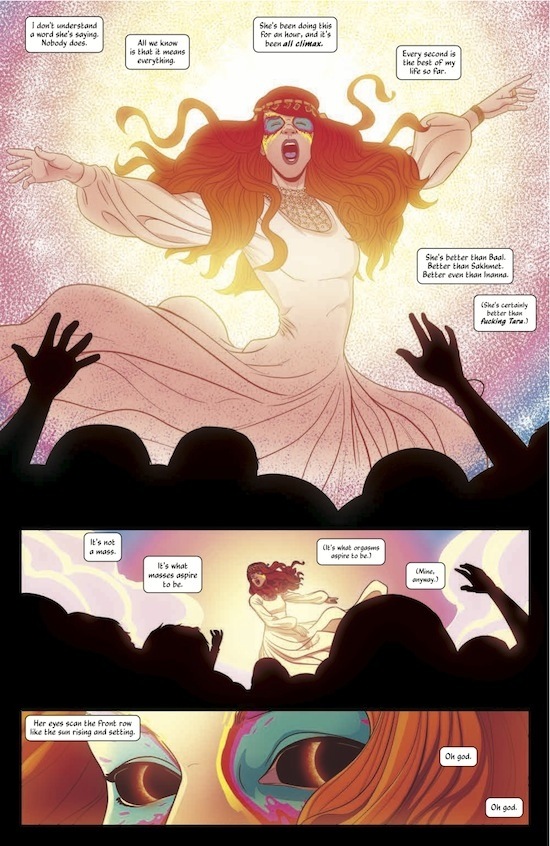
Kieron Gillen & Jamie McKelvie – The Wicked + The Divine Issues 1-5
(pub. Image)
‘Every ninety years twelve gods return as young people. They are loved. They are hated. In two years, they are all dead.’ It’s happening again now. And relevant to the era, they are pop stars. But gods have rules too and Lucifer’s broken them (what do you expect?). She’s killed two would-be assassins with a click of her fingers, and this same fate has been doled out to the judge at her trial. However, this last murder appears to be a set-up. Lucifer’s held in a mortal prison as well as being ostracised by her fellow gods. But überfan Laura is determined to prove Lucifer’s innocence, or at least figure out what is going on within the immortal community.
Hats off to Gillen and McKelvie, the team that brought us Phonogram, for this, like the pop music world it deals with, is a story to get caught up in. And that despite, being a gentleman of a certain age, finding a lot of this whole juvenile and appalling world of self-obsessed teenagers, well, juvenile and appalling. (If you’re a self-obsessed teenager, read ‘teenager’, don’t worry, you’ll get through it, it gets better) The Wicked + The Divine is the pop music world without getting to hear the music, taken for granted that it’s extremely important. But also reinforcing, to those of us to whom music mattered almost too much, that hostility towards those who were only posing, who didn’t appear to give a fuck at all about the music (those who probably went on to become successful popstars themselves). Conversely, on the other side of this sparkly coin, there’s so much more to Pop Music than just the music. Who among us hasn’t bought a record because the sleeve looked cool or because they fancied the singer or third trombonist? This, this is what’s so special about The Wicked + The Divine, how personal it gets, how it reflects those times to you, however you took them. And upon re-reading it’s just fucking good writing. With the last issue of part one out now, we get the depth we were after all along. We see more of what makes these characters what they are, the pain and pathos behind their chaotic world, how they relate to each other and how we relate to them. More of this please. And luckily, according to Gillen in the letters pages (well worth reading), a lot more are planned.
Issues 1-5 will be collected as The Faust Act (nice pun there), out November 12th. – Aug Stone
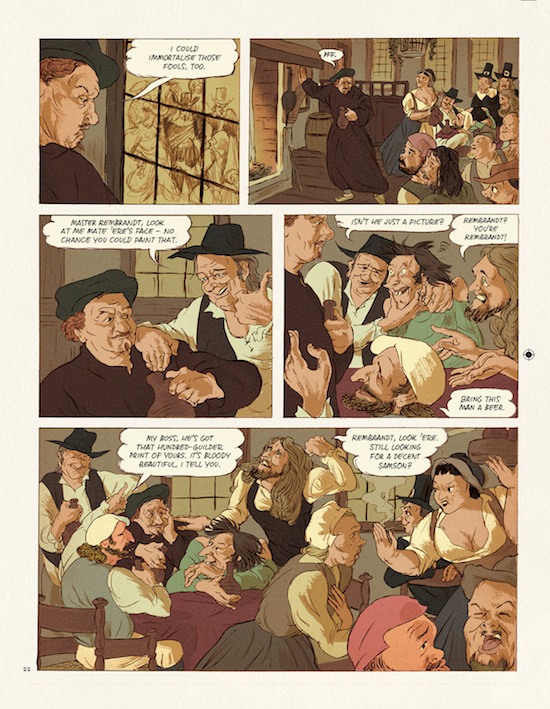
Typex – Rembrandt
(pub. SelfMadeHero)
This book is STUNNING. An impressive achievement that took Typex three years to complete. A biography of the Dutch master, taking us through his procession of wives, cantankerous business associations, and glimpses into the lives of his two children. Rembrandt comes across as a man only interested in satisfying his lusts for painting, women, and obtaining curious possessions (a detailed list of which is given on page 135, a whale skeleton being mentioned, not for the first time). But like Rembrandt himself, it is the art that shines through in Typex’s book, far overshadowing the story. The tale skips around betwixt significant periods in the artist’s life. How Typex chooses to depict the story is wonderful, picking up on interesting minor details within the scenes, always showing what is necessary but sweeping us up in the whole flow, visually and conceptually. Favouring the use of the browns beloved by his subject, Typex nevertheless makes for plenty of colour work in the present, whilst flashbacks are shown as detailed sketches in tan, beige, or ochre. Death and fishheads abound, as well as the figure of an elephant. From page one, we see this creature’s arrival in the port of Amsterdam, with Rembrandt sketching it amongst the eager crowd, and such an animal touchingly wends its way in some form throughout the book. Seriously, check out Typex, a new Dutch master. – Aug Stone
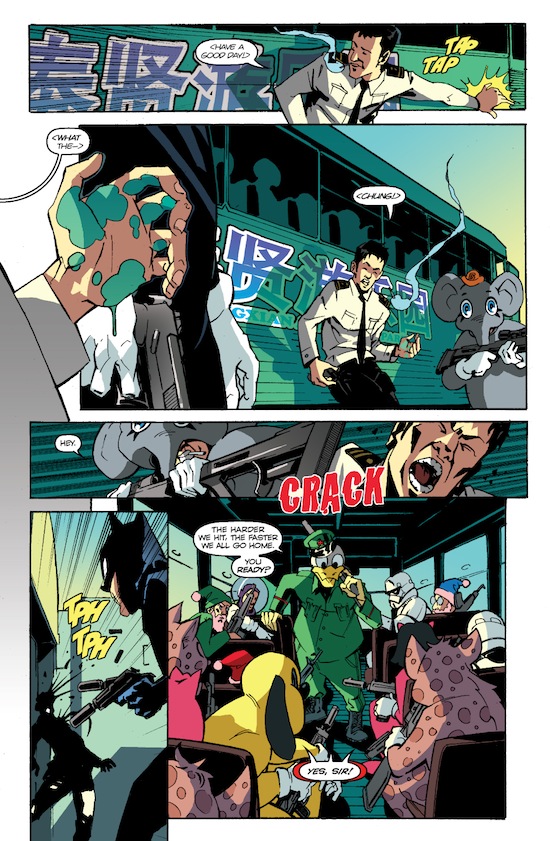
Jörg Tittel & John Aggs – Ricky Rouse Has A Gun
(pub. SelfMadeHero)
Ex-soldier Richard Rouse finds himself destitute in China after abandoning the Afghan war. With his daughter coming to visit for Christmas, he applies for a job at Fengxian Amusement Park. Fengxian’s ‘General Fucking Manager’ Hucheng (a lover of all things American, this is how he refers to himself) is inspired by Richard’s name and bestows it upon his new mouse character costume (itself looking quite like Mickey). A terrorist plot unfolds, led by a deranged American. With his daughter’s life and that of 500 others at stake, Richard and one security guard must take on this large operation. The artwork is excellent despite details within the ultraviolent action not always being easy to follow.
On the surface, there’s a good deal of fun here, with minor characters such as Ratman, Bumbo, and Rambi, as well as the Shanghai themepark bearing more than a passing resemblance to Disneyland. But at Ricky Rouse’s heart is an examination of the differences between the Chinese and American way of thinking about copyright – how China ingests Western icons and regurgitates entities entirely Chinese, something foreigners may not understand as such creations still legally bear a strong resemblance to the original. Hucheng explains and justifies: "I tell you what is a rip off! For Hollywood to make and remake the same movie ten times every year. Remake here, sequel there, like the public has amnesia. Charging five dollars more each time just for 3D…This is Ricky Rouse. Built on the past, designed for the future. A Chinese original. And don’t let anyone tell you different."The story goes deeper still, delving into the horrors of war, terrorism, and mentally unstable powerful individuals. The ending is quite shocking with the statement it’s making, or rather blatantly implying. For saying such outright, echoing much else in the tale, would surely be grounds for a lawsuit. – Aug Stone
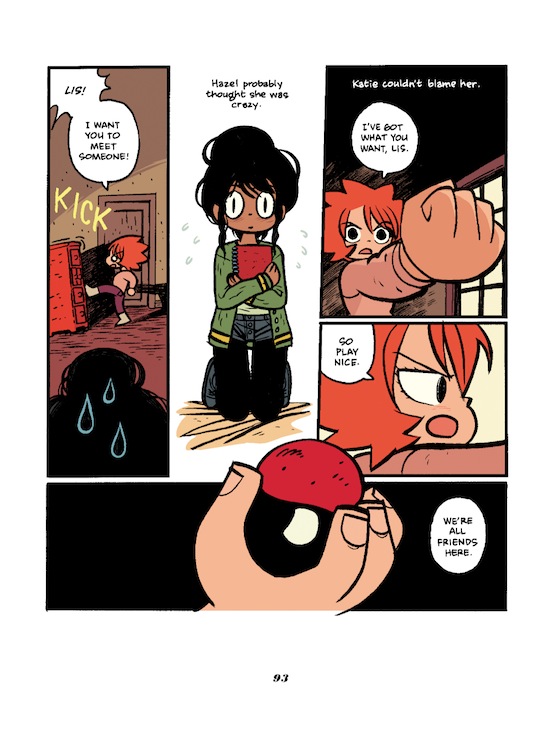
Bryan Lee O’Malley – Seconds
(pub. SelfMadeHero)
Katie, a chef in the process of opening a new restaurant, happens to meet Lis, the ‘house spirit’ of her current one. Lis gives Katie a mushroom that allows her to correct a mishap that occurred earlier that day but with the warning ‘only once’. Of course when Katie’s ex Max shows up and there are further delays opening the new bistro, she blatantly defies that caveat again and again. Enter a supernatural element, the consequences of ‘changing the universe’. O’Malley uses the full implications of the title – multiple chances and choices, the time ticking away on our life’s dreams. All combine in Katie’s tantalising quest for perfection and the addiction to believing that with ‘just one more’, she’ll get it right.
The territory is familiar – ex’s, pop culture references, not entirely likeable main characters – but this is certainly Bryan Lee O’Malley’s best looking book yet. The detail and composition of the panels is impressive. His interior architecture approaches the work of Joost Swarte and Chris Ware while the outside scenery possesses the charm of the small city setting. Subtle details make re-reading worthwhile. I particularly like his use of the picture frames on page 40 and how continuous close-ups on an eyeball move us to a new day on page 50. The dialogue between the narrator of the captions and Katie is good fun indeed. And one can’t help but fall a little bit in love with the character of Hazel. – Aug Stone
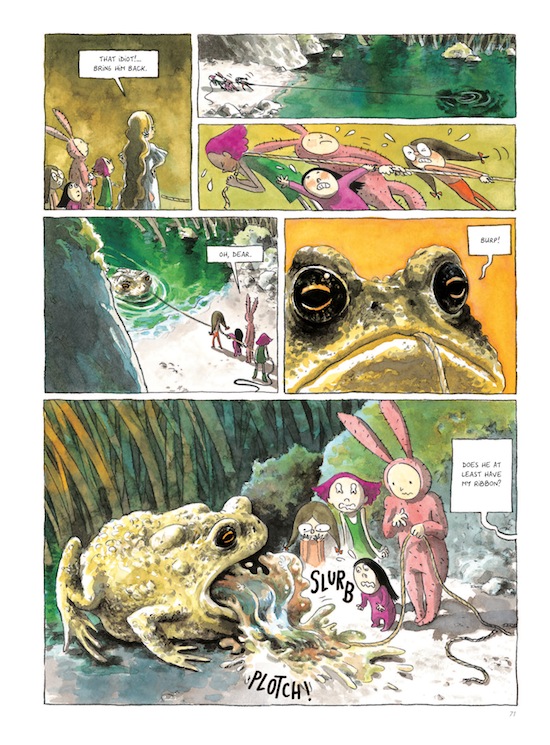
Fabien Vehlmann & Kerascoët – Beautiful Darkness
(pub. Drawn & Quarterly)
The womb these creatures (and the story) emerge from is a corpse. Their host body left to rot in an ordinary forest, Aurora and co. climb out from their previously known comfort and must now find their way amongst nature. Despite the cute cartoon characteristics of the cast, the setting they’re in is very ‘real’. The woods and its denizens present danger, animals possess little anthropomorphic qualities, acting on instinct and communicating via unintelligible squeaks that Aurora must learn in her effort to obtain food for the common good. But few of her cohorts are so philanthropic and soon factions splinter and backs are knived as quick as one turns around. Basest natures are given free reign and soon, with survival pushed to the forefront, these will become the order of the day. A story of how easily things can corrupt when hardship carries ego on its shoulders. And when those in charge give their subjects only the bare minimum needed to survive, and that only in order to keep on serving them.
Beautiful Darkness‘ chilling view of human nature and existence is shown by the fact not a soul realises their old Arcadian home is now a decaying cadaver. And that the casts’ adorable outer sheen remains all through the ensuing devastation. This tale of altruism annihilated by the frivolity and fickleness of evil is made all the more harrowing by the very real admission that these qualities lay within each of us, all too willing to spring to the forefront if we let our guard down for even a second. – Aug Stone
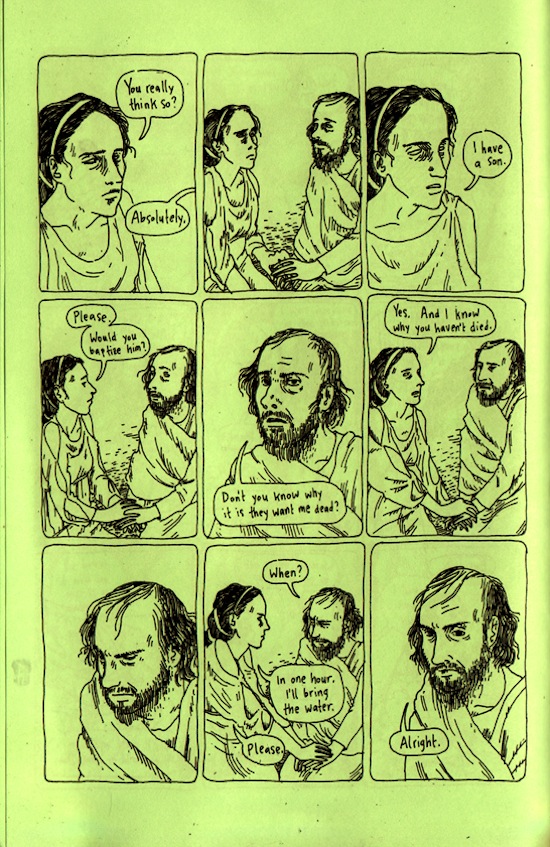
Julia Gfrörer – Palm Ash
(self-published)
Her work’s escaped me til now, being that Julia Gfrörer’s Fantagraphics debut is out of print, but Palm Ash works well as an introduction. Gfrörer’s strengths and concerns are delivered in a quick, efficient dose, synthesizing things bleak and twisted into little ink drawings of people. About martyrs, both interpersonal and religious, Palm Ash uses the emotional resource of relationships to demonstrate the inevitable moment of separation from God, parent and lover. Gfrörer sold the comic "set during the Diocletianic Persecution", and while we may differ in our ideas of fun, the description initially implied something set stiff in the tone of historical fiction, foreshadowing certain manners of speech, unnecessary pretentions and facts I’d soon forget. But it’s not so at all; instead, the "Diocletianic Persecution" is wrapping around the other components, dressing the truth in colorful bullshit so as to give the narrative fuel. She writes Roman soldiers and maids with want in their conversations, and her angular, pithy line art demonstrates a constant weakness capable of ruining them. The coliseum acts as the only definite thing in Palm Ash. It’s a comic book obsessed with close ups of human faces. And even though few shots of open architecture plague the eye, you always sense the setting off panel, casting judgement or some watchful eye on the exploits of the people. The question is whether or not the scenery dictates these characters’ destinies, or if it’s simply them, scenery only a scapegoated witness. One could sit here and enact some sort of personal response to the social commentary Gfrörer presents with Palm Ash, and in some sense I have in my own mind, but for now it’s the heavier feeling of helplessness that upsets me. It’s the idea of our fucked up little circus under the eye of something unbiased, just watching, and this makes me wonder if it is the coliseum who’s to blame after all. – Alec Berry

